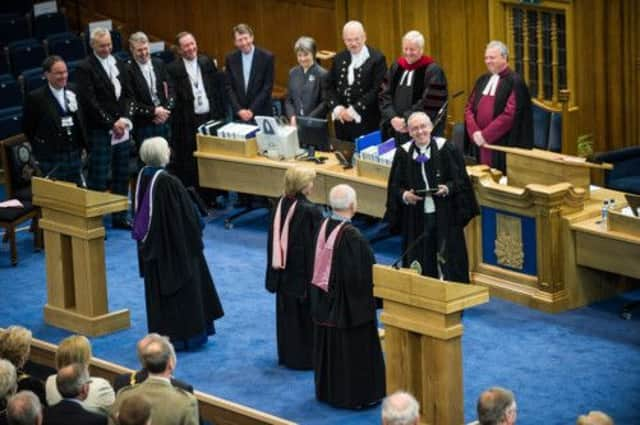Gay ministers set to win Kirk’s blessing


The Rev Ian Watson, a leading member of the Church of Scotland’s evangelical wing, which believes that homosexuality is prohibited by biblical scripture, was last night gloomy about the prospect of securing enough votes to retain the prohibition on gay clergy.
He said a motion permitting gay ministers, but giving congregations an opt-out, was likely to pass as the Church seeks to “represent society”.
Advertisement
Hide AdAdvertisement
Hide AdThe minister of Kirkmuirhall, near Hamilton, told The Scotsman: “Most people realise that the revisionists will win. I have not spoken to anybody on the traditionalist wing that thinks the traditionalists will win and I also expect to lose.
“The reason is that the Church of Scotland prefers to represent society rather than be a prophetic voice in society. The evangelicals have never been so pessimistic and demoralised than they are at present.”
Today, the 725 commissioners of the General Assembly of the Church of Scotland, which includes both ministers and church elders, will spend hours in debate and then vote on three possible options.
The first, “traditionalist”, option is that the church will not accept practising gay clergy.
The “revisionist” option would see gay ministers treated in the same way as heterosexual clergy.
A third “compromise revisionist” option, known as the “mixed economy”, would allow churches to appoint ministers in same-sex relationships but permit individual congregations to opt out if they wish.
It is the third option, which is being endorsed by David Fergusson, professor of divinity and principal of Edinburgh University’s divinity school, that is the one most likely to secure the most votes.
If passed, the issue will then go to the presbyteries for approval under the Barrier Act.
Advertisement
Hide AdAdvertisement
Hide AdLast night, Mr Watson said: “It will happen because society wants it to happen and the Church of Scotland will not be far behind.”
The row over homosexual ministers was sparked in 2009 when the Assembly voted to uphold the appointment of openly gay minister the Rev Scott Rennie to Queen’s Cross Church, in Aberdeen. The decision prompted a further vote on the issue in 2011, which saw the Assembly agree to allow openly gay ministers appointed prior to 2009 to remain in their posts, but placed a moratorium on further appointments and establish a theological commission to examine the implications in allowing further appointments.
The conclusions of the commission’s report will form the basis of today’s debate. It has been claimed that up to 60 congregations have indicated that they might leave the Church if the revisionist stance is voted through.
Mr Watson believes that the evangelical wing of the Church is being taken for granted. He said: “There are people who argue that the Church of Scotland should be a broad church and that the evangelicals should stay, but there is a feeling that they just want them to stay for their money – however, their ideas and beliefs are not respected.
“People say you can’t turn back the clock, but CS Lewis said that you can turn back the clock, especially if the time is wrong. We are not saying this to be dinosaurs, we genuinely believe that society is wrong.”
Mr Watson does not believe there will be a large schism with ministers breaking from the church as it would result in financial hardship for them. But he said he thinks there will be a “haemorrhaging of evangelical members, particularly in the cities where they have other churches available to them”.
Last night, the Rev Iain Torrance, a former moderator of the General Assembly, and a long-term supporter of gay clergy said: “What I hope is that we will not see a victory for either side. A victory is not the best way to put it.
“This is a Church, not a political campaign, what I hope we can do is negotiate a way forward that is inclusive but also progressive and so my hope is that the church will stay together, but can also be more welcoming of greater diversity.
How the decision will be made
Advertisement
Hide AdAdvertisement
Hide AdThe debate is expected to begin about 11 am. Many predict discussion will go on until between 4 and 6pm with as many as 50 speeches.
At the end, commissioners, made up of both ministers and elders, will each use an electronic counter to vote on one of three options.
1: The traditional view that there will be no ordination of ministers in same sex relationships in the future.
2: The revisionist stance that active gay ministers should be treated in the same way as heterosexual clergy.
3: The compromise revisionist stance which will allow congregations to appoint ministers in same- sex relationships, but permit individual congregations to opt out if they wish.
Whatever the vote, the decision will be subject to the Barrier Act, designed to prevent hasty policy changes. This means that the decision will go to each of the Church of Scotland’s presbyteries for a vote. If the revisionist stance wins an overall majority, then next year’s General Assembly will again vote on the decision.
SEE ALSO: